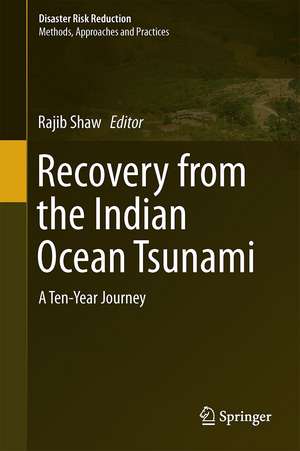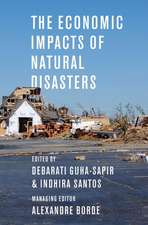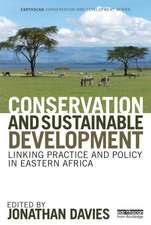Recovery from the Indian Ocean Tsunami: A Ten-Year Journey: Disaster Risk Reduction
Editat de Rajib Shawen Limba Engleză Hardback – 8 oct 2014
The book has 31 chapters, drawing lessons from four countries: India, Indonesia, Sri Lanka, and Thailand. There are five sections: Overview (10 chapters), Indonesia (8 chapters), India (6 chapters), Sri Lanka (5 chapters), and Thailand (2 chapters).
The primary target groups for this book are students and researchers in the fields of disaster risk reduction, environment, and development. The book provides them with a good idea of the current research trends and lessons over the past decade of recovery initiatives. Another target group comprises practitioners and policy makers, who will be able to apply the knowledge collected here to establishing policy and making decisions.
| Toate formatele și edițiile | Preț | Express |
|---|---|---|
| Paperback (1) | 802.76 lei 38-44 zile | |
| Springer – 23 aug 2016 | 802.76 lei 38-44 zile | |
| Hardback (1) | 961.23 lei 6-8 săpt. | |
| Springer – 8 oct 2014 | 961.23 lei 6-8 săpt. |
Din seria Disaster Risk Reduction
- 18%
 Preț: 796.61 lei
Preț: 796.61 lei -
 Preț: 394.30 lei
Preț: 394.30 lei - 18%
 Preț: 790.46 lei
Preț: 790.46 lei - 15%
 Preț: 654.12 lei
Preț: 654.12 lei - 18%
 Preț: 967.08 lei
Preț: 967.08 lei - 24%
 Preț: 640.30 lei
Preț: 640.30 lei - 18%
 Preț: 1009.16 lei
Preț: 1009.16 lei - 18%
 Preț: 890.54 lei
Preț: 890.54 lei - 18%
 Preț: 942.94 lei
Preț: 942.94 lei - 15%
 Preț: 646.30 lei
Preț: 646.30 lei - 18%
 Preț: 782.24 lei
Preț: 782.24 lei - 18%
 Preț: 898.75 lei
Preț: 898.75 lei - 18%
 Preț: 956.33 lei
Preț: 956.33 lei - 18%
 Preț: 947.50 lei
Preț: 947.50 lei - 15%
 Preț: 643.34 lei
Preț: 643.34 lei - 24%
 Preț: 921.08 lei
Preț: 921.08 lei - 18%
 Preț: 951.91 lei
Preț: 951.91 lei - 18%
 Preț: 894.97 lei
Preț: 894.97 lei - 15%
 Preț: 641.85 lei
Preț: 641.85 lei - 24%
 Preț: 639.88 lei
Preț: 639.88 lei - 18%
 Preț: 790.14 lei
Preț: 790.14 lei - 18%
 Preț: 729.18 lei
Preț: 729.18 lei - 18%
 Preț: 784.13 lei
Preț: 784.13 lei - 18%
 Preț: 783.50 lei
Preț: 783.50 lei - 18%
 Preț: 784.48 lei
Preț: 784.48 lei - 24%
 Preț: 699.00 lei
Preț: 699.00 lei - 15%
 Preț: 642.18 lei
Preț: 642.18 lei - 15%
 Preț: 651.51 lei
Preț: 651.51 lei - 18%
 Preț: 943.57 lei
Preț: 943.57 lei - 15%
 Preț: 649.54 lei
Preț: 649.54 lei - 24%
 Preț: 690.45 lei
Preț: 690.45 lei - 24%
 Preț: 899.55 lei
Preț: 899.55 lei - 18%
 Preț: 962.27 lei
Preț: 962.27 lei - 15%
 Preț: 652.17 lei
Preț: 652.17 lei - 15%
 Preț: 646.75 lei
Preț: 646.75 lei - 20%
 Preț: 587.30 lei
Preț: 587.30 lei - 15%
 Preț: 647.40 lei
Preț: 647.40 lei - 18%
 Preț: 957.75 lei
Preț: 957.75 lei
Preț: 961.23 lei
Preț vechi: 1172.24 lei
-18% Nou
Puncte Express: 1442
Preț estimativ în valută:
183.95€ • 199.75$ • 154.52£
183.95€ • 199.75$ • 154.52£
Carte tipărită la comandă
Livrare economică 22 aprilie-06 mai
Preluare comenzi: 021 569.72.76
Specificații
ISBN-13: 9784431551164
ISBN-10: 4431551166
Pagini: 520
Ilustrații: XV, 503 p. 143 illus., 106 illus. in color.
Dimensiuni: 155 x 235 x 35 mm
Greutate: 0.9 kg
Ediția:2015
Editura: Springer
Colecția Springer
Seria Disaster Risk Reduction
Locul publicării:Tokyo, Japan
ISBN-10: 4431551166
Pagini: 520
Ilustrații: XV, 503 p. 143 illus., 106 illus. in color.
Dimensiuni: 155 x 235 x 35 mm
Greutate: 0.9 kg
Ediția:2015
Editura: Springer
Colecția Springer
Seria Disaster Risk Reduction
Locul publicării:Tokyo, Japan
Public țintă
ResearchCuprins
From the contents: Overview of ten years of recovery lessons from Indian Ocean Tsunami.- Institutional and legal arrangements and its impacts on urban issues.- Environmental Recovery and Mangrove Conservation: Post Indian Ocean Tsunami Policy responses in South and Southeast Asia.- Lessons from the Recovery of the Education Sector after the Indian Ocean Tsunami.- Indian Ocean Tsunami Warning System (IOTWS).- Post-tsunami Urban Recovery Process and Afterwards in Sri Lanka, Thailand, and Indonesia.
Notă biografică
Rajib Shaw is a Professor in the Graduate School of Global Environmental Studies of Kyoto University, Japan. He worked closely with the local communities, NGOs, governments and international organization, including United Nations, especially in the Asian countries. He is currently the President of Asian University Network of Environment and Disaster Management (AUEDM). His research interests are: community based disaster risk management, climate change adaptation, urban risk management, and disaster and environmental education. He has published several books in the field of disaster and environmental management. He is also the Chief Editor of Asian Journal of Environment and Disaster Management.
Textul de pe ultima copertă
During the past 10 years following the 2004 Indian Ocean Tsunami, invaluable lessons have been learned and great changes have been observed. Immediately after the disaster, the second World Conference on Disaster Reduction was held in Kobe, Japan, and formulated the Hyogo Framework for Action (HFA: 2005–2015). HFA provided a platform and framework for changes and innovations, many of which were part of the recovery programs in the different countries affected by the 2004 disaster. This book is a modest attempt to review the lessons learned through the recovery process in the affected region.
The book has 31 chapters, drawing lessons from four countries: India, Indonesia, Sri Lanka, and Thailand. There are five sections: Overview (10 chapters), Indonesia (8 chapters), India (6 chapters), Sri Lanka (5 chapters), and Thailand (2 chapters).
The primary target groups for this book are students and researchers in the fields of disaster risk reduction, environment, and development. The book provides them with a good idea of the current research trends and lessons over the past decade of recovery initiatives. Another target group comprises practitioners and policy makers, who will be able to apply the knowledge collected here to establishing policy and making decisions.
The book has 31 chapters, drawing lessons from four countries: India, Indonesia, Sri Lanka, and Thailand. There are five sections: Overview (10 chapters), Indonesia (8 chapters), India (6 chapters), Sri Lanka (5 chapters), and Thailand (2 chapters).
The primary target groups for this book are students and researchers in the fields of disaster risk reduction, environment, and development. The book provides them with a good idea of the current research trends and lessons over the past decade of recovery initiatives. Another target group comprises practitioners and policy makers, who will be able to apply the knowledge collected here to establishing policy and making decisions.
Caracteristici
On the 10th anniversary for the Indian Ocean tsunami, this book is the first compilation of post-disaster learning Contains a unique combination of generic cases, which spread over the affected countries and detailed country-specific case studies Collects diverse perspectives from authors including academicians, practitioners and professionals in the respective field





